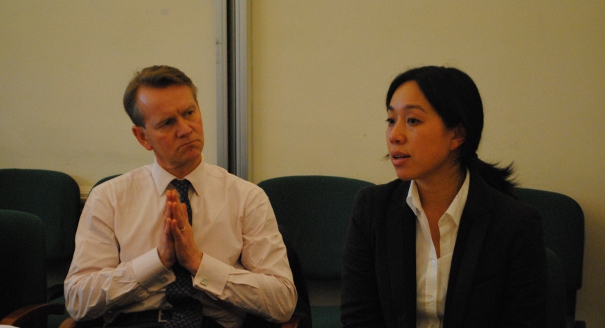{
"authors": [
"Heather Allen",
"Philippe Crist",
"Vincent Leinere",
"Martin Porter",
"Shin-pei Tsay"
],
"type": "event",
"centerAffiliationAll": "",
"centers": [
"Carnegie Endowment for International Peace",
"Carnegie Europe"
],
"collections": [],
"englishNewsletterAll": "",
"nonEnglishNewsletterAll": "",
"primaryCenter": "Carnegie Endowment for International Peace",
"programAffiliation": "",
"programs": [],
"projects": [],
"regions": [
"Europe",
"North America"
],
"topics": [
"Foreign Policy",
"EU"
]
}
Transatlantic Views on Low-Carbon Urban Mobility
Tue, February 28th, 2012
Brussels
IMGXYZ3546IMGZYXAs the U.S. Congress debates proposals to reauthorize a federal transportation bill and the European Union forges ahead with its own policy roadmap for transport and climate change, cities across both the United States and the EU are investing in numerous strategies to reduce carbon emissions from transportation.
Carnegie Europe and Edelman | The Centre co-hosted a roundtable discussion with a select group of policymakers engaged in issues of transportation, urbanization, and decarbonisation. Heather Allen of the Transport Research Laboratory, Philippe Crist from the International Transport Forum Research Centre of the Organisation for Economic Co-operation and Development, Vincent Leiner from the European Commission's Directorate General for Mobility and Transport, and Carnegie’s Shin-pei Tsay compared how the United States and the European Union are decarbonizing urban transport. Martin Porter of Edelman | The Centre moderated.
Discussion Highlights
- Shared Challenges: Tsay emphasized the importance of developing a common EU-U.S. framework to measure sustainable mobility. Tsay and Leiner agreed that despite the increasing social, economic, and environmental impacts of urban mobility, the issue is not being adequately addressed at any level. In light of the recent launch of the European Commission’s “Europe 2020” growth strategy, Leiner also highlighted the need to build a better, more modern and sustainable transport system to support developing economies, especially in regards to urban transport.
- The Importance of Stakeholders: Participants agreed that urban mobility issues need to be couched as a win-win scenario to ensure various stakeholder buy-in. Tsay addressed the current gap between levels of U.S. government, noting that the urban dimension is not yet recognized as part of the federal transportation system, while local initiatives are not financially or politically represented at the federal level. Although the European Union is leading with the recognition of urban mobility at the policy level, it faces a similar challenge: how to bring various actors–public and private–together to commit to common urban mobility objectives and their implementations.
- Performance Measures and Innovation: To adequately address the various needs of different stakeholders in urban mobility, Tsay insisted that the United States and the European Union must each work to define actors and parameters by which everyone can measure sustainable mobility. The United States must describe its national vision for transportation as the European Union has, allowing both to draw key priorities. Both transportation systems must work to establish innovative frameworks to recast current infrastructures for more sustainable urban mobility.
Carnegie does not take institutional positions on public policy issues; the views represented herein are those of the author(s) and do not necessarily reflect the views of Carnegie, its staff, or its trustees.
